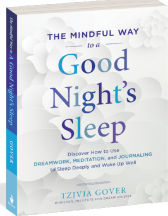Turn sleepless nights into sweet slumber
Q: You’re an expert on sleep and dreams. So, I can’t imagine you have trouble sleeping. But if you do, what triggers it? Anxiety, stress, work, fatigue? And do you handle it?
A: Who me, have trouble sleeping? Never!
Okay, that’s wishful thinking. Truth is, I have had a complicated relationship with sleep practically from the start. In fact, I could write a book on it. In fact, I have!
The Mindful Way to a Good Night’s Sleep is the culmination of what I’ve learned from a lifetime of grappling with, and ultimately healing from, my fears of the night and nightmares. But because I wrote a book on sleep and dreams, people think I sleep like an angel and have sweet dreams every night. But I encounter the same sleep issues anyone else does. The difference is, rather than medicate myself with pills, potions, or distractions, I take a mindful approach when sleep stealers like stressful thoughts keep me up. And I’ve even learned to regard my sleep impediments as my teachers. After all, they present opportunities to practice mindfulness and letting go.
The biggest challenge to sleep for me, and countless others, is anxiety. These three tips can help enormously on that front.
1. CLOSE THE BOOK ON NEGATIVE THINKING: Our brain chemistry when we sleep and dream is low on mood-boosting neurochemicals like serotonin. So, our thoughts at night skew toward the negative. The first step to sleeping soundly is to stop believing the dark or worrisome thoughts that keep you up at night.
TRY THIS: When a negative thought arrives at night, remind yourself that you don’t have the brain chemistry to handle this right now, and instruct yourself to drop it. If it persists, write the worrisome thought in a notebook and tell yourself if you still believe it at noon tomorrow, you can address the issue then. For now, literally and metaphorically, close the book on it.
2. AIKIDO FOR ANXIETY: I’m no martial arts master, but I do know that in Aikido rather than fight against your opponent, you redirect their power to defend yourself. So, stop fighting anxiety at night and instead engage with it.
TRY THIS: When anxiety sneaks up on you at night, greet it with curiosity instead of dread. Notice the thoughts without engaging with them, just watch them pass through your mind. What’s happening to your breath? Observe it objectively. Can you locate the anxious feeling in your body? Where is it strongest? Does it move, say from your throat to chest, and to your shoulders? Can you trace the sensation to its edges–can you find the boundary where anxiety dissolves into nothingness? Just keep observing without judging or wishing the feeling away. After five or ten minutes, the anxiety might recede, as your body and mind drift into relaxation. You might even fall asleep. But even if you don’t you’ll hover in a restful, and even dreamy state–and in the morning you might even feel refreshed.
3. MEDITATION, NOT MEDICATION: Rather than stay up too late then pop a pill to sleep, learn to sit through the sadness or anger without reaching for your phone, a snack, or stirring up some drama or activity. Yes, I’m suggesting that you learn to meditate. But wait! Don’t touch that dial. I realize that it’s popular these days to talk about mindfulness and meditation, but it’s less popular to actually put in the time on the cushion. But try it!
TRY THIS: Meditating in the evening, right before bed–or in bed–is the best way I know to sleep soundly, without having to rely on pills or potions. It’s easier than you think. Even a brief 5-minute meditation makes bedtime more relaxing, and it will ultimately change your experience of dreaming, too.
You can find some of my favorite beditations in The Mindful Way to a Good Night’s Sleep.
© 2021 Tzivia Gover, all rights reserved



